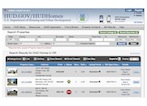HUD Home Buying Update
August 28, 2013, by Mark Wheeler
So you want to buy a HUD foreclosure property? We hear this a lot. Many of the HUD properties in our area are at the lower end of the price spectrum, and so they can appear enticing.
What is a HUD property? It is a property where the previous owner used an FHA loan to buy the property. That owner has now been foreclosed upon & the US Department of Housing & Urban Development (HUD) is the entity that handles the sale of the property.
If you are considering buying a house from HUD, you should definitely carefully read their purchase contract in advance. I can easily forward you a copy. There is a version of the contract for owner occupant buyers, and another version for investor buyers. These are new contracts as of 7/29/13.
There has been a major change! For owner occupant buyers, HUD has decided that they will not release the buyer’s earnest money back to the buyer if the buyer revokes their offer, unless HUD decides that the buyer’s reason for revoking is “good enough.” This is very different from most sales where the buyer can unconditionally disapprove of the inspections & receive their earnest money refund. This kind of unilateral decision could make a buyer lose their earnest money if they back out of the sale due to disapproval of the home inspection(s). It appears that HUD has made the decision to now solely pursue investor buyers, as I’ve rarely seen a “normal” buyer who would agree to that clause. Investment buyers of HUD properties do not have any return of earnest money possibility at all, but investors sometimes have a greater tolerance of risk and more petty cash than folks just looking for a home.
Oddly, the 25 page HUD owner occupant purchase contract does mention a 15 day inspection period, but it is vague as to what this means. Then, on the 9th page of the contract plus addenda it states:
“The purchaser will receive a refund of the entire earnest money deposit under the following circumstances: 1. There has been a death in the immediate family (contract holder, spouse, or children living in the same household). 2. There has been a recent serious illness in the immediate family that has resulted in significant medical expenses or substantial loss of income, thus adversely affecting the purchaser’s financial ability to close the sale. 3. There has been a loss of job by one of the primary breadwinners, or substantial loss of income through no fault of the purchaser. 4. For Insured sales, HUD (or a Direct Endorsement underwriter using HUD guidelines) determines that the purchaser is not an acceptable borrower. 5. For Uninsured sales, the purchaser was pre-approved for mortgage financing in an appropriate amount by a recognized mortgage lender and, despite good faith efforts, is unable to obtain mortgage financing. “Pre- approved” means a commitment has been obtained from a recognized mortgage lender for mortgage financing in a specified dollar amount sufficient to purchase the property. 6. For other good cause, as determined by HUD.”
So, there is no explicit language that gives the buyer a way to revoke their offer due to unconditional dissatisfaction of the inspection(s) without losing their earnest money, unless the buyer wants to assume that HUD will be generous & allow it “For other good cause, as determined by HUD.” We do not recommend that assumption at all. We recommend that the buyer assume that they will not get their earnest money back if they revoke their offer. In essence HUD has made earnest money a non refundable deposit. This is what I’ve been hearing from other Realtors across the country too, and I’ve heard reports of many buyers getting burned by this policy.
If you do still want to consider HUD houses, you should definitely read this contract in advance of sitting down to write an offer on a HUD house, because when you write the offer you will be signing it and acknowledging that you have read, understand & agree with their terms. These terms are very different from those of the widely locally used Oregon Real Estate Forms sale contract, which has much more buyer protection. I am legally not allowed to interpret the HUD documents beyond the most basic explanations, so I do have to recommend you consult an attorney if you have questions. However, please run your questions by me to see if I can help at all.
Note also that they will not pay for an owner’s title insurance policy so that will add about $700 – $900 or so to the buyer’s closing costs if they are getting a mortgage. Note also that they request the buyer’s social security number, some folks have a problem with that. If so, there’s no way to move forward.
Many foreclosures are not HUD houses. All banks & lien holders have their own rules, HUD has just changed theirs in a very buyer unfriendly fashion.


Follow Us